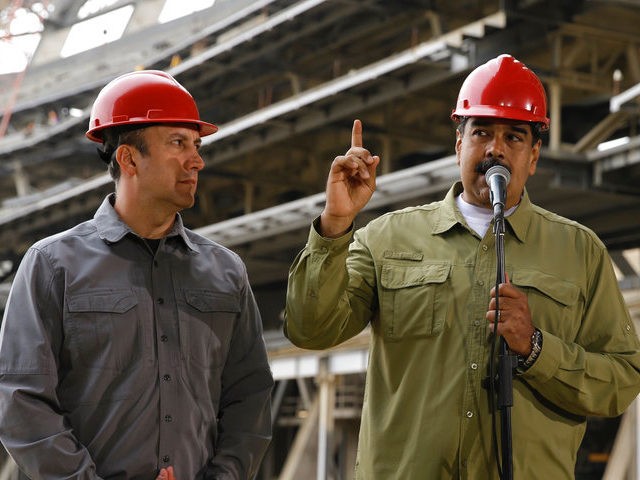Any potential agreement between the administration of President Joe Biden and Venezuelan dictator Nicolás Maduro for America to purchase Venezuelan oil – as reports have rumored Biden to be interested in this week – would have to go through the country’s oil minister, Tareck El Aissami, long suspected of ties to Hezbollah and wanted in America for drug trafficking.
Reports this weekend revealed that Biden had sent a delegation to Caracas to meet with Maduro and attempt to re-establish communication after America ceased accepting Maduro as the rightful president of the country and sanctioned its oil industry. Maduro lost the presidency in 2019 when the National Assembly exercised its power to replace him to swear in current legitimate president Juan Guaidó. Washington continues to recognize Guaidó as the true president even as he has failed to obtain any real-world power over Venezuela – and even as it negotiates with Maduro.
The reports, scattered throughout American corporate media outlets, suggested that Biden had sent the delegation to discuss the possibility of lifting sanctions and importing oil from the country. Former President Donald Trump sanctioned Petróleos de Venezuela (PDVSA), the government oil company, in response to years of human rights abuses against civilians. Biden, the reports said, had planned to ban importing oil from Russia in the wake of leader Vladimir Putin’s full-scale invasion of Ukraine last month.
Biden announced this week that he would indeed ban importing Russian oil, and Maduro confirmed on Monday that he had met an American delegation. Maduro mentioned nothing about selling American oil, however, claiming the group had only come to Caracas for a “respectful, cordial, diplomatic meeting.” Oil Minister El Aissami appeared to indicate that the country is preparing to export significantly more than it currently is this week, announcing on Wednesday that he hoped to expand the country’s output to 2 million barrels a day by the end of 2022. Venezuelan produced 755,000 barrels a day in January 2022.
Some on the left have begun pressuring Biden to buy Venezuelan oil to offset the small percentage of oil used in America that prior to this week came from Russia, according to the Associated Press. Others have noted that human rights-abusing states like Saudi Arabia and Iran, a key Venezuelan ally, may also fill the gap. A deal with Venezuela would raise several other concerns, including the potential lack of efficacy in preventing Russia from profiting given Venezuela’s billion-dollar debt to Russia and Maduro’s close personal ties to Putin.
El Aissami himself presents significant challenges for an American deal, challenges gone mostly unmentioned in establishment American media. Extensive evidence has linked the oil minister, appointed in 2020 after holding a variety of high-ranking titles, including top liaison to Russia, to the Shiite jihadist organization Hezbollah for years. Immigration and Customs Enforcement (ICE) issued a wanted notice for El Aissami in 2019 on the grounds of the Department of Justice accusing him of engaging in intercontinental drug trafficking while holding top positions in the Venezuelan government. The U.S. government branded him a Specially Designated Narcotics Trafficker in 2017.
“Tareck El Aissami is one of Hezbollah’s great bagmen, a sort of huge funder, and the money goes through the networks, and then, as you say, that money comes back through investments,” Venezuelan journalist and drug cartel expert Vanessa Neumann told Breitbart News in 2018. “[Ground sources] have told me that, based on their perspective, he is a big player on the funding side, rather than the operations side.”
“Tareck El Aissami is protected to some degree by Hezbollah, and through that protection, they’re not going to show up at his office because then, they would be easily detected. His financial systems do benefit Hezbollah,” Joseph Humire, the executive director of the D.C.-based Center for a Secure Free Society, said at the time.
In a report published in 2020 by the Atlantic Council, Humire detailed an extensive network of Hezbollah operatives and fundraisers present in Latin America that benefit directly from ties to the Maduro regime. El Aissami is a protagonist in the story:
While stationed at the Bolivarian Republic’s embassy in Damascus, Syria, [Latin America Hezbollah operative and Venezuelan diplomat] Ghazi Nassereddine helped arrange meetings between senior Venezuelan officials and high-ranking Hezbollah operatives.
According to DEA informants, in or about 2009, Ghazi fixed a meeting in Syria between Hezbollah and Venezuela’s then-Interior Minister Tareck El Aissami, and the Venezuelan military counterintelligence chief, Hugo Carvajal Barrios.25 The meeting allegedly prompted a cocaine-for-weapons scheme between the FARC and Hezbollah that materialized in 2014 when a Lebanese cargo plane full of small arms (AK-103s, rocket-propelled grenade launchers, etc.) arrived at the presidential hangar (rampa 4) of the Maiquetia International Airport in Caracas
ICE claimed El Aissami personally directed drug trafficking operations when branding him a “most wanted fugitive” in 2019.
“He facilitated shipments of narcotics from Venezuela, to include control over planes that left from a Venezuelan air base and drug routes through the ports in Venezuela,” ICE asserted. “In his previous positions, he oversaw or partially owned narcotics shipments of more than 1,000 kilograms from Venezuela on multiple occasions, including those with the final destinations of Mexico and the United States.”
Reports have not confirmed if El Aissami was part of the meeting between Maduro and the American delegation, and, at press time, the sides have not announced any agreement on purchasing Venezuelan oil.

COMMENTS
Please let us know if you're having issues with commenting.